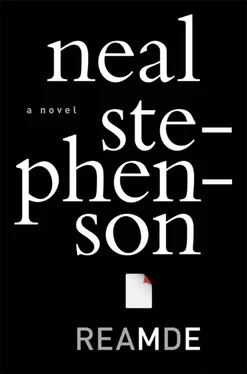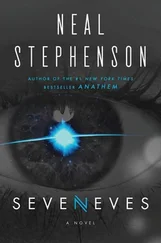He was just about to let her rip and go blasting across when he noticed two figures running toward him across the turnaround. They had emerged from hiding places in the trees. Something was weird about their gait. Their legs were moving properly, but their arms weren’t pumping.
Their arms weren’t pumping, he saw, because each of them was carrying a handgun in a two-handed grip. And they were looking right at him.
To get across the dam he would have to ride directly at these guys, whoever they were, as they stood in his path. They would have plenty of time to empty their magazines at him.
He’d already done a one-eighty. He kept the momentum going and turned it into a three-sixty, which was to say that he got himself turned back around with the dam behind him and the Schloss to the front. Fleeing into the Schloss itself wasn’t going to work. Whoever these guys were, they’d already gone into the place, done whatever they wanted to do to Dodge—some old drug-running grievance?—cut the power and the phone lines, set fire to it. He needed to put some distance between himself and them. He aimed the bike, not at the Schloss, but down the road that ran past it, and wrenched the throttle to max and popped the clutch and actually stood her up on her rear wheel, doing a wheelie as he accelerated onto the road.
As he went by the Schloss he saw in his peripheral vision a shape like a lily, made out of yellow-orange light, and realized that he was staring into the muzzle of a rifle that was firing at him: a rifle with a flash arrester on the end of its barrel, channeling the flame into six equiangular jets, like petals. The rifle let loose one, two, three, four rounds, producing a hammering noise with each one, and behind him he could hear the sharp poppity-pop of those gunmen on the dam, letting loose everything they had in their magazines.
A rightward bend in the road put some trees between him and the crazy men who were trying to kill him. He finally had the presence of mind to shut off the bike’s headlamp. His arm moved heavily. He had a vague memory of taking a blow a few seconds ago, a rock thrown up by one of his tires or something. It must have deadened a nerve. His body was old and overused and suffered strange infirmities from time to time.
A light was flashing in the trees, and bobbing as it flashed. Coming down a slope. Headed, not for him, but for a point on the road ahead of him.
The light bounded onto the road, then swung upward to illuminate the bearer’s face. It was too far away for him to resolve it clearly, and he didn’t want to get much closer. He was out of shotgun range and out of pistol range, but if this person had a rifle—
“Chet! It’s me! Zula!”
He gunned it forward and stopped next to her. As he drew closer, he noted with interest that she was carrying a pump shotgun.
“We thought you were dead,” he said.
“I’m not.”
“Where’s Dodge?”
“Not here. Come on, we have to get moving.”
“No shit.” Because he could now hear the voices of the gunmen, who were running after them.
Zula safetied the shotgun. She was wearing a large, haphazardly made-up pack. She got a foot on one of the passenger pegs, then swung her leg over and sat down. As soon as he sensed the weight of her body against his back, he let out the clutch and began moving down the road again, just at a running pace at first—so the gunmen wouldn’t be able to gain any more ground—then faster, once he felt as though Zula had got her balance and wasn’t liable to flip off the bike backward.
There was a while, then, when all they did was ride. Chet liked that part of it, riding along the road in the dark, a salmon-colored light spreading over heaven’s vault above, Zula’s arms around his waist.
They didn’t talk at all until they reached the turnaround just short of the wrecked mine complex where a million old gray planks were trying to avalanche down into the river. From here they could ride up a short ramp to the bike and ski path, which the Harley could easily negotiate. But it seemed reasonable to stop.
“I don’t see any choice but to keep going,” Zula said.
“There’s nothing there, ” Chet said, nodding down the trail.
“Except the U.S. of A.,” she pointed out. “And you know how to get there, right?”
“Not on this thing! This’ll only take us as far as the tunnel.”
“But that’s a few more miles between us and the jihadists,” she pointed out.
“What did you call them?”
“And you know how to go beyond that point. On foot. Right? You used to do it with Richard.”
“Oh, it’s been years, girl.”
“But you know. You know the way. And they don’t. So we can outdistance them.”
“We should wait for them to pass us. Then double back.”
“They’ll be looking for that. They’re smart. They’ll post someone to guard the crossing at the dam.”
“Still, if we stayed up in the trees, moved through the woods—”
“Listen. Some of those guys have Richard. They have Dodge.”
“Dodge is okay?”
“As far as I know. Anyway, they’re south of us. They don’t have a motorcycle. We can just about catch them.”
“Why the hell would we want to catch them!?”
“All I have to do is show myself to Uncle Richard—let him know they don’t have me hostage any more—and then he’s free, he can run into the woods, get away from these guys.”
Chet said nothing. Not because he didn’t agree. But because he was having difficulty concentrating.
“I have to go save his life,” Zula said. Sounding almost matter-of-fact. Ah, I see I failed to make myself clear… here’s the situation… I have to go save his life .
It gave him something to focus on. “Well, since you put it that way, I’ll take you to the tunnel,” he said, and he let the bike rumble off the end of the road and onto the loose gravel of the trail.
By the time they made it to the end, he was aware, somehow, that he had blood coming out of him. He couldn’t remember how he knew this, how he’d first been made aware of the fact. There was a dim dreamlike memory of the girl on his back—Zula—mentioning it to Chet, and Chet laughing it off and just cranking up the throttle a little higher.
Then he noticed that he was lying on the ground staring up into a blue sky.
Had they crashed?
No. The Harley was parked next to him. Zula had rolled out a camping pad. He had been lying on it, dozing. Covered with a sleeping bag.
She squatted next to him and pulled the sleeping bag away to expose the right side of his torso. His shirt was missing. Bare skin shrank from the cool air. She regretted what she saw, but she wasn’t surprised by it. She’d been looking at it while he lay there.
“How long have we been stopped here?” he asked.
“Not too long.”
He was too embarrassed to come out and ask what was wrong with him. He felt that it must be obvious.
She did something involving a bandage. She had a pathetic little first aid kit.
“Stop it,” he said gently. “It’s a waste of time.”
“Then what do you want to do?”
“Send you on your way. Save Dodge. I’ll follow.”
“You’ll… follow?”
“I can’t go near as fast as you. But there’s no reason for me to just stay here. I want to die on the forty-ninth parallel.”
She was squatting on her haunches with her arms crossed over her knees. She looked south, into the sunlight, toward the border. Then she dropped her head onto her forearms and sobbed for a while.
“It’s okay,” he said.
“No, it’s not. People are dead.” She raised her face, let herself tumble back onto her bottom, stretched her legs out next to Chet. “I didn’t kill them. But they’re dead because of things that I did. Does that make sense? Peter. The pilots. The people in the RV. They’d all be alive if I’d decided differently.”
Читать дальше





